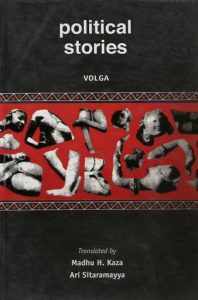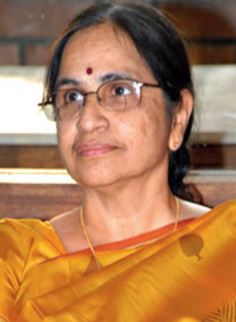Political Stories by Volga

Political Stories-11 Elections – Part 2
Vimala arrived at the elementary school before seven the next morning and found that two polling officers and as A PO had everything ready, Agents of the to contestants had already arrived. Vimala attached the label on the ballot bas and had it ready. They all sat there waiting expectantly.
The first woman voter appeared only at about nine, though the polling booth for men had been active since eight with hoises and screams intermittently heard from there. The police force was ready with their nightsticks.
Women would not leave home until their morning chores were done. Only fifty or so votes were cast by ten o’clock.
Having heard some commotion, Vimala came out of the polling station to have a look. A rough character outside the male polling booth was threatening the folks who came to vote: ‘If you don’t vote for us, we will kill you. Let me warn you. The other side shouldn’t get a single vote?
The men standing in the queue responded variously, some muttering beneath their breath, some angry, while others were frightened or silent. The policemen looked away as if it were not their business. Vimala strode back into her station and asked her assistant, “How come the police don’t remove the thug threatening the people? What do we do if he comes here? How come the officers in the other room are not protesting?” She was agitated and concerned. The assistant smiled calmly, “You don’t know who he is. He is a very important man. If his party wins, the next government will be in his control. Why should we or the police mess with him? All we care about is that people vote and that there is good accounting of how many voted. Our job ends there. Please don’t get us into unnecessary headaches. Just give out the ballot papers. If you confront them, whatever has to happen will happen and, on top of that, you may be harmed.”
Vimala was thoroughly confounded. Is this what elections were about? What was the point of this drama? The expense, the hungama, the rules, the effort… What was the point? People were voting out of fear. Those who didn’t show up … their votes were defrauded by whichever side had power and authority. Why this pretense of an election?
Why not say explicitly that whoever had power was the ruler.
That way the people would at least realize the truth for what it was. But then, it was easier to rule over people if you fooled them. That was the purpose of the elections.
Vimala wanted to scream. She wanted to cry. She was heart-broken. She had to remain silent while a fraud was being committed right in front of her. Otherwise, she could be hurt.
Distressed and powerless, Vimala slumped into her chair.
Voting was going on briskly. The goonda was standing between the two polling stations with a gun in his hand. A police inspector came by, greeted him with a hand shake and began exchanging pleasantries with him. Vimala couldn’t hold back any longer.
“Can he stand here with a gun in hand and threaten people?
Why don’t you get him out of here?” she asked the inspec-tor. He smiled amusedly. “Who do you think he is? If he isn’t here, people will kill each other. His presence is essen-tral to keep peace here. You don’t worry. Polling will go on peacefully, everything will be alright,” he said and departed in a hurry.
At about three o’clock, the goonda came into the poling station. By then about three hundred women had voted and there was no one in line. He picked up the stack of balls papers and handed it to two young fellows who followed him in. They quickly stamped cach ballot and he folded one by one and dropped in the ballot box. Everyone on polling duty remained silent. Tears rolled down Vimals cheeks in her helplessness. Her colleagues stared blankly as wo hundred ballots were stuffed into the box. The other ballot papers did not have Vimala’s signature.
“Sign these papers!” he threw them at her.
“I won’t, she said firmly gritting her teeth.
“Look, madam. You will have problems if you mess with me. I can be as bad as I am good. Just listen to me and go home in peace. Otherwise…
” the goonda smiled at her vilely.
“You can do what you want, you can even kill me, but I will not sign.”
“Is that so?”
“Vimala madam,” a colleague of Vimala’s came from the men’s polling booth. “Please, let us talk outside. Aya, please wait here for a second,” he requested the goonda and escorted Vimala out.
“Vimala garu, are you out of your mind? You think you can fight them?” he chided her.
“What do you mean? Should I keep quiet while they engage in this fraud right in front of my eyes? I can’t, even at the expense of my life,” Vimala spouted emotionally.
“You are really crazy. You think your life means anything to them? If you die, you think they will stop stuffing the ballot box? Let us say you sacrificed your life and prevented fraud here. How many Vimalas are there to stop fraud at all the other polling stations? Listening to you talk in the department I thought you were an intelligent woman. Didn’t you know these elections are a gimmick? A fraud? You think you can fix the system by blocking the polling of about four hundred votes? Will you give your life for that? You are talking like a little girl. Please go and sign those papers.
We will be done with this crap in another four hours or so.
It will all be a distant memory tomorrow. Please go in and sign those papers, please.”
Vimala walked into the station. She understood the situa-tion, though it was difficult to compromise. She picked up a pen and signed the ballot papers. The ballots went into the box. She wrote on the accounting sheet how many ballots were cast. Her assistants sealed the box, put it in the cloth bag and sewed it shut. The lorry arrived. Vimala climbed into the cabin.
“Madam, please sit here behind me,” asked the driver.
“Why’
“How should I say this, I thought you noticed while we drove here yesterday. That officer who sat next to you is a rogue.
Last night he was talking dirty about you with the cleaner.”
“What does he know about me?”
“Madam, he doesn’t need to know anything about you. He just went on describing you until his oral itch subsided. Our cleaner felt like trashing him, but then, he is an officer, who knows what he is capable of, so he restrained himself?”
“Rascal. let him come, I will each him a lesson,” screamed Vimala, scaring the driver.
Madam, I would not have told you if I knew you would react like this. If you yell at him, you will be the loser. Why did I ask you to sit behind me? Just so he could not touch you. I just want to take you back to the municipal office safe, unharmed. Tomorrow he and you will go your separate ways. What is the use of making a ruckus today?” Vimala was aghast. The police inspector arrived on his motorbike just then, with a pistol in his hand, and stopped in front of the lorry.
How wonderful it would be if she could snatch that gun and shoot this officer! Shooting, nothing less, is what the rascals deserve. These elections, these people’s representa-tives, these male rogues … everybody should be shot. But she could do nothing. She remained just a spectator. The people’s representatives frightened people with guns and acquired votes and political power. Men acquired the power right from their birth to kill women with their bare looks.
Vimala’s head felt like a volcano.
What could she do? What was the solution? How could she fight against this injustice and humiliation?
Where was the origin of their authority and arrogance? How did they harness it? How could people – people like her – acquire power?
These and many other questions swarmed around her head.
*****
(To be Continued-)



